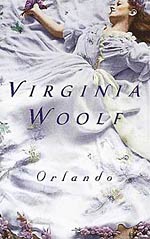
![]() ParallelWorlds
ParallelWorlds
2/5/2014
![]()
Hogarth Press, 1928
Intended Audience: Adult
Sexual content: Mild
Ace/Genderqueer characters: Yes
Rating: PG
Writing style: 3/5
Likable characters: 4/5
Plot/Concepts: 4/5
Orlando was a nobleman by birth, although all he really wanted was to be a poet. Throughout his years as a man he experiences love, lust, and loss, until one day he wakes up in a female body and must go about his/her life just the same. She quickly learns the ridiculous restrictions of behavior based on sex, but her goal remains… to transcend so much of life while still finding an anchor to hold on to.
Written as a fictitious biography, Orlando was apparently a love letter of sorts to Virginia Woolf's lover and friend, Vita. As such it has a logic (or lack thereof) all its own, verging on farce and fantasy. Most aspects of Orlando's life are ordinary for the time she lives in—the most noticeably unusual thing is that the body she inhabits transcends both sex and age, allowing her to experience three centuries despite only calling herself thirty-something years of age. This can be taken as psychological symbolism or literal (and completely unexplained) magic. The important thing is that I found Orlando's experience with gender and life's deepest questions to be relatable even when made difficult through flowery run-on prose.
The writing style was not my favorite thing about this story, but it does lend itself well to introducing the reader to Orlando's mind. As a boy and girl both, Orlando sees the world as a beautiful but sometimes overwhelming composite of experiences and metaphors, and worships the printed word as if it came from God. Fiercely romantic but in a way which resists attachment or obligation, she begins life in blind privilege and at one point finds herself stifled by the expectations of the age. Sometimes it's easy to get lost in all the long rambling paths the writer takes us through in order to describe some minute point of emotion or philosophy, and by the end of it I started to find the sometimes page-long sentences tiresome, even though I knew they served a purpose. So, it may be difficult to get through for many readers, and the annotated copy I was reading didn't have a very good structure for looking up the notes, therefore I was left in the dark on a lot of contextual information which could have been useful. Despite all this I enjoyed the book because of its strong characterization.
Although the plot itself is meandering as a biography must be, I gave this section a high score because there are some moments of clever satire and commentary on social norms that made me grin or even laugh out loud with their heavy sarcasm. There is a lot of wiggle room in a narrative like this for strange or incongruent events, so it's hard to criticize it based on continuity or whether it "makes sense" since I don't think it was intended to make sense outside of the questions it asks. I appreciated the atmospheric difference between the three centuries Orlando lives, and the creativity Woolf employed in bringing the reader into each scene and the sometimes absurd situations Orlando is found in.
Woolf's conclusion about gender (at least Orlando's gender) seems to be that a great deal of it is socially inflicted rather than an innate sense. Orlando is portrayed as a blank slate who accepted manhood because that was all he had known, and when he woke as a woman she was not dismayed or even perturbed in any way until she was forced into a social situation where men treated her differently because of what she was wearing. The photographs included of Orlando as a man and woman show that Orlando always had a fairly androgynous face, and none of Orlando's inner feelings about her identity really change that much until she has lived a long time as a woman and been exposed to the expectations of society. There is a real sense of bearing with social niceties without feeling a particular attachment to them—Orlando's real identity is as a spirit married to nature, although she does eventually also marry a man whom she suspected to be a woman. It was easy to think of both Orlando and her husband as genderqueer. Orlando in particular seems to be agender or gender-fluid, not particularly attached to either and happily switching between men's, women's, and androgynous clothing depending on the occasion or mood she is in.
I loved how matter-of-fact Woolf was in describing Orlando's indifference to her own physical shape. Although I can't really look up to Orlando as a bastion of moral or emotional maturity, she is nevertheless inspiring in her independence and resistance to the definitions others place upon her. Even when she goes along with them, and sometimes is swept up and tossed about in her explorations of what it means to have a life, or to love, I got the feeling that underneath it all some core of her remains firmly herself alone and will never be fully corrupted or disillusioned by the dullness of conventional marriage, social gatherings, or formulaic profit-driven writers. She is imperfect and often immature, but it is through the juxtaposition of her confused growth and her solid commitment to being herself that she is most accessible.
As I've said, the writing style is not for everyone, and the sometimes ridiculous "plot" elements could be off-putting to some readers. The thing that made me cringe the most was simple exposure to the stereotyping and racist attitudes or words which pop up now and again in the text, although these have very little to do with the story itself. Despite all that, the characterization of Orlando is strong enough, and the gender playfulness compelling enough, that I believe any genderqueer, trans*, or nonbinary person should definitely give this novel a chance.